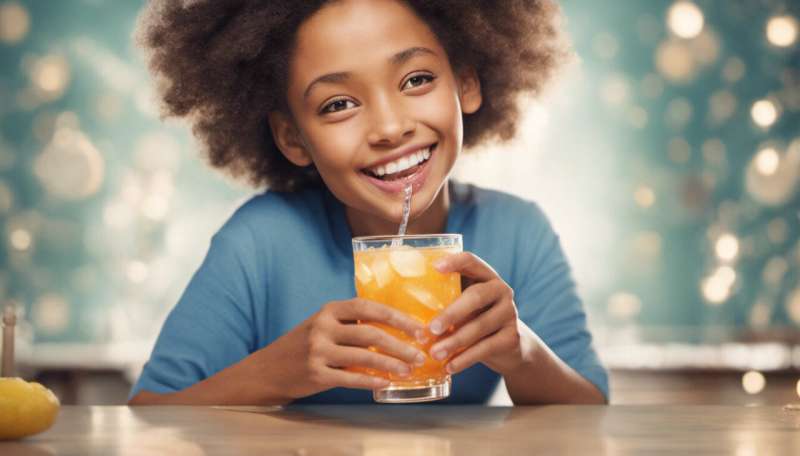Credit: AI-generated image (disclaimer)
Children deserve to get clean and safe drinking water. But, in developing countries such as Indonesia, not all children have access to it.
A new survey has found this can drive them to consume sweet beverages, posing a risk to their health.
Child rights organisation Project Child Indonesia surveyed 272 respondents in ten elementary schools in Yogyakarta and Fakfak, West Papua. The survey showed that a third of the respondents turned to sweet beverages as they lacked access to clean and safe drinking water.
Sweet lure
Consuming sweetened beverages can increase the risks of obesity, insulin resistance and dental caries.
Children often turn to sweetened beverages as they are more attractive and taste sweeter than plain water.
Massive advertising of sweetened drinks also attracts children to consume them.
In this regard, a lack of access to clean and safe drinking water may exacerbate these habits.
Our respondents said they preferred sweet drinks as they believed the cost of packaged mineral water was as expensive or more expensive than sugary beverages. Bottled mineral water costs twice as much in Fakfak as a bottle of mineral water in Surabaya, East Jawa.
Solution: install water filters in schools
Project Child Indonesia carried out the survey with independent researchers in Yogyakarta and Fakfak in 2019 as a basis to provide clean and safe drinking water in the latter city.
A report from Project Child Indonesia indicates that only few of more than 270,000 elementary schools in Indonesia provided free, clean and safe drinking water for their students.
The condition is believed to be much worse in Papua, the most eastern part and least developed region of Indonesia. The 2015 Indonesian National Socioeconomic Survey showed the Papuan region still lacked access to drinking water, despite improvements in Java and Bali islands.
Schools in Papua also do not offer adequate environmental and health education. As a result, children lack awareness of the importance of safe and clean drinking water.
Based on our findings, we created a project to address the water access problem faced by children in West Papua.
We installed drinking water filters in eight schools in Fakfak, West Papua. Water filters are important in Papua as the price of mineral water is high there.
Water filters can help Papuans get cheaper drinking water as they only need to process water supply from rainwater or local drinking water companies. Before consuming water from these sources, we need to treat it to remove chemical contaminants.
We also designed a campaign to introduce the habit to consume safe and clean drinking water. We established drinking water committees involving parents, teachers and representatives from local communities.
This committee has worked together with local communities Fakfak Mengajar and Kitong Bisa to ensure the program's safety and sustainability.
For this project, we work closely with the government's local health and education agencies. This shows a collaborative effort between various stakeholders in society is required to ensure children have access to clean and safe drinking water.
Provided by The Conversation
This article is republished from The Conversation under a Creative Commons license. Read the original article.![]()























